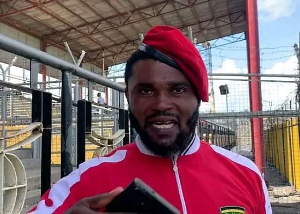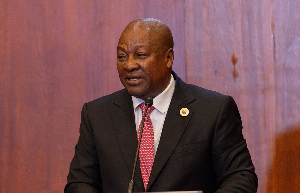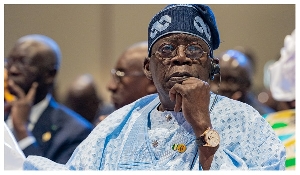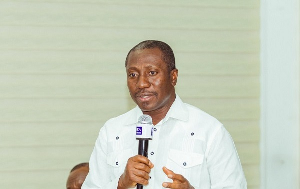Kwasi Gyan-Apenteng
You have to feel a certain sense of weariness about Ghana these days. It is not exactly pessimism or despair, but the mood is definitely neither light nor welcoming. Let me put it this way: it is becoming increasingly difficult to find nice things to say about our country, and this despite the government’s efforts to convince us that we have never had it so good. Perhaps, our money side is as good as they try to convince us it is – what with oil and high commodity prices and the lot. The near-despair is due to one word: politics. Our politics is in a dark place the like of which we have not witnessed since the dark bad era of coups, rebellions and countercoups. A nation that cannot conduct an honest registration of voters is knocking at the gates of trouble.
Let us consider what has been happening in this country over the past two weeks: potential voters have been invited to register. In essence, this is as simple as writing down your details such as name, age address and so on, taking your voter’s card and getting on with the rest of your life. Could anything be simpler? And yet when you open any newspaper, or especially when you turn on your radio in any direction on the dial you would think that a registration exercise is a cross between trench warfare and rocket science. It appears that all over the country some invisible forces are operating undercover moving people to places they have never been to register them for the December elections.
According to these reports, the invisible forces are not only distorting the internal arrangements ahead of the vote, but there are allegations of whole truckloads of people crossing our borders under the sponsorship of political parties or individuals to come and register illegally so that they can vote for their sponsors in the coming elections. If what we are hearing is true, it means that the December election is already flawed and the people, whoever they are, that will be “elected” to rule over us will occupy their positions by fraud. Think about it and think about it again. A nation ruled by fraud is doomed. This is not a melodramatic statement. It is a historical fact.
However, one has to believe that there is nowhere near as much fraud as is being alleged. There are irregularities, and we will come to that presently, but not fraud on a massive scale. It is true that here and there some minors have tried to register, and for the record we have had the odd non-Ghanaian also making the attempt, and the fact that these have been detected should be a plus for our system. However, as with most things in Ghana, what should be a plus has turned negative, fuelling wild allegations of fraud and badness of all sorts. So, what is really happening?
What is happening is the mood of near despair in which mutual distrust is the prevailing temper of public discourse and communications. In the era of the NDC and NPP it appears that nothing is as it seems to the rest of us. An innocent cock-up by the electoral commission or even a minor mishap by a minor official is immediately turned into a case for national upheaval because every politician is looking for a sign, not of a good turn, but of evil intentions on the part of the opponent. This is the way in which politics is being conducted in Ghana today – demonise the opponent in order to look good in the eyes of the voter.
It is a bad strategy because it is creating a mood of pessimism in the country, and this is bad for morale and business. Worse, it is creating an impression of suspicion not only of our politicians but of the political process itself. This is the source and result of the familiar resorts to abuse and insults that have become part of the political process; the process is no longer respected. If a proper poll of attitudes is conducted I am sure that politics and politicians – and journalists – would rate rather low in public esteem. Another spillover from the political mood is that mistrust is becoming the accepted way of interacting among citizens who are becoming suspicious of one another, usually not for any good reason.
It is into our fragile political atmosphere that cock-ups by the Electoral Commission and its filed staff come like petrol onto fire. It is understandable that a new system such as this biometric registration, being tried for the first time, would have some technical and operational problems. Normally, we should accept that as a natural part of the experiment, and in a more tolerant mood, Ghanaians are not too demanding. But politics is different, it appears. Politicians have whipped their followers into a zero tolerance for mistakes and every blunder, however minute, is magnified a thousand times in content and presumed effect. Radio 24/7 means that each technical or operational gaffe is immediately transmitted to an audience already primed for cynicism and trouble.
At the beginning of the registration exercise, there were reports from Bolgatanga of some serious trouble which, depending on the radio station, was either being resolved or worsened by different players in the political drama. On one radio station there were frantic calls for the police to intervene as the numbers of people waiting swelled at some registration centres and people became frustrated. This led to intricate conspiracy theories being spun like spider webs. When I spoke on the phone with a friend who was in thick of matters he explained that he thought the EC had not tested the machines in the Bolgatanga heat, which on that day was touching 45 degrees Celsius in the shade. In those harsh conditions most computer hardware, not to speak of the human brain, would need patience. In our politics, patience is in very short supply.
This kind of frantic fear of being cheated, which is the result of our dishonesty, cannot be good for us. Consider this: all parliamentary candidates, including most MPs, District Chief Executives and perhaps most ministers, have gone to their constituencies to police the registration. This means that a fair chunk of government business, and business in general, has come to a halt or slow down merely because voters are being registered. What will happen when the election itself is close?
The blame for the dark mood in the country must be placed at the door of the kind of politics we have chosen to play. At a recent public event, Alhaji Ahmed Ramadan, Chairman of the People’s National Convention, put his finger on the issue when he observed that the first past the post or winner takes all politics is the source of acrimony and tension in our politics. He is right. We need to have a serious rethink as a nation about how we select those who look after our affairs. The winner takes all may work for some people, it is not working for us. There are alternatives to consider and we must not lock ourselves into only one option because it is the one “we have always used”.
In the meantime, we must not fall for the politicians’ Ananse trick of exaggerating every mishap into a crisis; it is in their interest to create a picture of direness from which only they can rescue us. Probably, I am wrong and things are as bad as they say. But I hope not. Let us be wary of the stories the politicians and their media allies, some call them the “rented press” on both sides, are telling us. That way, we can make some sense of the reality around us.
gapenteng@hotmail.com
kgapenteng.blogspot.com
This article originally appeared oin the Diary column in the Mirror
Opinions of Sunday, 8 April 2012
Columnist: Gyan-Apenteng, Kwasi














